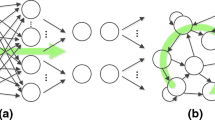Abstract
Recent developments in the area of deep learning have been proved extremely beneficial for several natural language processing tasks, such as sentiment analysis, question answering, and machine translation. In this paper we exploit such advances by tailoring the ontology learning problem as a transductive reasoning task that learns to convert knowledge from natural language to a logic-based specification. More precisely, using a sample of definitory sentences generated starting by a synthetic grammar, we trained Recurrent Neural Network (RNN) based architectures to extract OWL formulae from text. In addition to the low feature engineering costs, our system shows good generalisation capabilities over the lexicon and the syntactic structure. The encouraging results obtained in the paper provide a first evidence of the potential of deep learning techniques towards long term ontology learning challenges such as improving domain independence, reducing engineering costs, and dealing with variable language forms.
Access this chapter
Tax calculation will be finalised at checkout
Purchases are for personal use only
Similar content being viewed by others
Notes
- 1.
- 2.
- 3.
Possibly after resolving anaphora, coreference, or other linguistic phenomena.
- 4.
The goal of our work is to show that the ontology learning task can be tackled using neural network based models trained in a end-to-end fashion. Assessing the best neural network architecture to implement statistical learning for this task is beyond the scope of our work.
- 5.
More precisely, the constructs considered correspond to the \(\mathcal {ALCQ}\) Description Logic, a well-known, expressive extension of \(\mathcal {ALC}\) with qualified number restrictions.
- 6.
The list of all the sentence and formula templates is available here: https://drive.google.com/file/d/0B_FaCg6LWgw5Z0UxM2N1dTYwYkU.
- 7.
The several training, evaluation and test sets used in the experiments are available here: https://drive.google.com/file/d/0B_FaCg6LWgw5ZnBkSEVONWx2YW8.
- 8.
References
Baader, F., Calvanese, D., McGuinness, D., Nardi, D., Patel-Schneider, P. (eds.): The Description Logic Handbook: Theory, Implementation, and Applications. Cambridge University Press, Cambridge (2003)
Bengio, Y., Ducharme, R., Vincent, P., Janvin, C.: A neural probabilistic language model. J. Mach. Learn. Resour. 3, 1137–1155 (2003)
Bowman, S.R., Potts, C., Manning, C.D.: Recursive neural networks for learning logical semantics. CoRR abs/1406.1827 (2014)
Cho, K., van Merrienboer, B., Gülçehre, Ç., Bougares, F., Schwenk, H., Bengio, Y.: Learning phrase representations using RNN encoder-decoder for statistical machine translation. CoRR abs/1406.1078 (2014)
Cimiano, P., Mädche, A., Staab, S., Völker, J.: Ontology learning. In: Staab, S., Studer, R. (eds.) Handbook on Ontologies, pp. 245–267. Springer, Heidelberg (2009)
Graves, A., Wayne, G., Danihelka, I.: Neural turing machines. CoRR abs/1410.5401 (2014)
Grefenstette, E., Hermann, K.M., Suleyman, M., Blunsom, P.: Learning to transduce with unbounded memory. CoRR abs/1506.02516 (2015)
Kaljurand, K., Fuchs, N.: Verbalizing OWL in Attempto Controlled English. In: OWLED 2007 (2007)
Lehmann, J., Voelker, J. (eds.): Perspectives on Ontology Learning. Studies in the Semantic Web. AKA/IOS Press, Berlin (2014)
Ma, Y., Syamsiyah, A.: A hybrid approach to learn description logic based biomedical ontology from texts. In: ISWC 2014 Proceedings (2014)
Mesnil, G., He, X., Deng, L., Bengio, Y.: Investigation of recurrent-neural-network architectures and learning methods for spoken language understanding. In: INTERSPEECH 2013, pp. 3771–3775 (2013)
Mikolov, T., Yih, W., Zweig, G.: Linguistic regularities in continuous space word representations. In: NAACL HLT 2013, pp. 746–751 (2013)
Peng, B., Lu, Z., Li, H., Wong, K.: Towards neural network-based reasoning. CoRR abs/1508.05508 (2015)
Petrucci, G.: Information extraction for learning expressive ontologies. In: Gandon, F., Sabou, M., Sack, H., d’Amato, C., Cudré-Mauroux, P., Zimmermann, A. (eds.) ESWC 2015. LNCS, vol. 9088, pp. 740–750. Springer, Heidelberg (2015)
Petrucci, G., Ghidini, C., Rospocher, M.: Using recurrent neural network for learning expressive ontologies. CoRR abs/1607.04110 (2016)
Völker, J., Haase, P., Hitzler, P.: Learning expressive ontologies. In: Ontology Learning and Population: Bridging the Gap between Text and Knowledge, pp. 45–69. IOS Press, Amsterdam (2008)
Völker, J., Hitzler, P., Cimiano, P.: Acquisition of OWL DL axioms from lexical resources. In: Franconi, E., Kifer, M., May, W. (eds.) ESWC 2007. LNCS, vol. 4519, pp. 670–685. Springer, Heidelberg (2007)
Weston, J., Bordes, A., Chopra, S., Mikolov, T.: Towards AI-complete question answering: a set of prerequisite toy tasks. CoRR abs/1502.05698 (2015)
Weston, J., Chopra, S., Bordes, A.: Memory networks. CoRR abs/1410.3916 (2014)
Zaremba, W., Sutskever, I.: Learning to execute. CoRR abs/1410.4615 (2014)
Zeiler, M.D.: ADADELTA: an adaptive learning rate method. CoRR abs/1212.5701 (2012)
Author information
Authors and Affiliations
Corresponding author
Editor information
Editors and Affiliations
Rights and permissions
Copyright information
© 2016 Springer International Publishing AG
About this paper
Cite this paper
Petrucci, G., Ghidini, C., Rospocher, M. (2016). Ontology Learning in the Deep. In: Blomqvist, E., Ciancarini, P., Poggi, F., Vitali, F. (eds) Knowledge Engineering and Knowledge Management. EKAW 2016. Lecture Notes in Computer Science(), vol 10024. Springer, Cham. https://doi.org/10.1007/978-3-319-49004-5_31
Download citation
DOI: https://doi.org/10.1007/978-3-319-49004-5_31
Published:
Publisher Name: Springer, Cham
Print ISBN: 978-3-319-49003-8
Online ISBN: 978-3-319-49004-5
eBook Packages: Computer ScienceComputer Science (R0)




